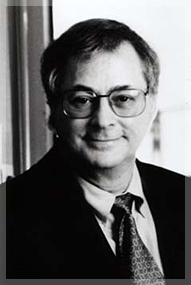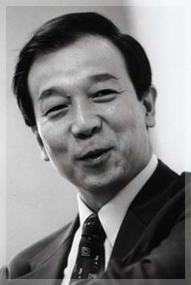The 2000 Keio Medical Science Prize Awardees
Arnold J. Levin

President, The Rockefeller University
Professor, Robert and Harriet Heilbrunn Laboratory of Cancer Biology
Reason for Selection
Theme: p53 as a tumor suppressor gene and an important signaling molecule involved in various cellular functions
Dr. Arnold J. Levine discovered the p53 protein in viral transformed cells and tumors. The c-DNA and gene for the p53 protein were cloned and the gene was shown to be a tumor suppressor gene preventing cancers. Fifty-five percent of all human cancers have mutations in the p53 gene and another twenty to thirty percent of cancers inactivate p53 functions. The p53 protein integrates signals and responds to cellular stress such as DNA damage, poor oxygen tension or inadequate energy sources. The p53 response to stress results in either cell cycle arrest or programmed cell death. The research on p53 will help our understanding of various cellular functions and mechanisms for tumor development.
Background
- <Education>
- 1961
- B.A., Biology, Harpur College, State University of New York
- 1966
- Ph.D., Microbiology, University of Pennsylvania, School of Medicine
California Institute of Technology Postdoctoral Fellow of the Public Health Service - 1968-1973
- Assistant Professor of Biochemistry, Princeton University
- 1973-1976
- Associate Professor of Biochemistry, Princeton University
- 1976-1979
- Professor of Biochemistry, Princeton University
- 1979-1983
- Chairman and Professor, Department of Microbiology, SUNY Stony Brook School of Medicine
- 1984-1996
- The Harry C. Wiess Professor in the Life Sciences, Chair, Department of Molecular Biology, Princeton University
- 1996-1998
- The Harry C. Wiess Professor in the Life Sciences, Department of Molecular Biology, Princeton University
- Present
- President & Chief Executive Officer, The Rockefeller University
Yusuke Nakamura

Director, Human Genome Center
Professor, Laboratory of Molecular Medicine
Institute of Medical Science, The University of Tokyo
Website
http://zlab.mit.edu/
Reason for Selection
Theme: Elucidation of various genetic diseases through human genome analysis
Dr. Yusuke Nakamura and his coworkers contributed to chromosomal mapping of hereditary diseases and cancer-related genes through isolation
and distribution of a large number of polymorphic DNA markers. They also made a number of important findings in the cancer research field; isolation of the APC gene (a tumor suppressor gene for colorectal cancer) as well as p53-target genes including p53R2 (a key enzyme for repairing damaged-DNA) and BAI1 (an angiogenesis inhibitor). In addition, his group discovered genes responsible for genetic diseases including gelatinous drop-like corneal dystrophy and tip-toe walking, a mouse model of ossification of the posterior longitudinal ligament of the spine. Identification of disease associated genes will lead to development of new diagnostic and therapeutic strategies for diseases.
Background
- <Education>
- 1977
- Graduated from Osaka University Medical School
- 1977
- Medical Doctor's License in Japan
- 1984
- Ph.D., Molecular genetics, Osaka University
<Academic Positions>
- 1977-1981
- Department of Surgery, Osaka University School of Medicine
- 1981-1984
- Research fellow, Institute of Molecular and Cellular Biology, Osaka University
- 1984-1988
- Research Associate, Howard Hughes Medical Institute, University of Utah
- 1987-1989
- Research Assistant Professor, Department of Human Genetics, University of Utah
- 1989-1989
- Senior Associate, Howard Hughes Medical Institute, University of Utah
- 1989-1995
- Head of Biochemistry Department, Cancer Institute, Tokyo
- 1994-
- Professor, Laboratory of Molecular Medicine, Institute of Medical Science, The University of Tokyo
- 1996-1999
- Professor, Department of Clinical Genetics, Osaka University School of Medicine
- 1995-
- Director, Human Genome Center, Institute of Medical Science, The University of Tokyo
- 1995-
- Head, Division of Genome Analysis, Cancer Institute, Tokyo
- 1989-1995
- Head of Biochemistry Department, Cancer Institute, Tokyo
